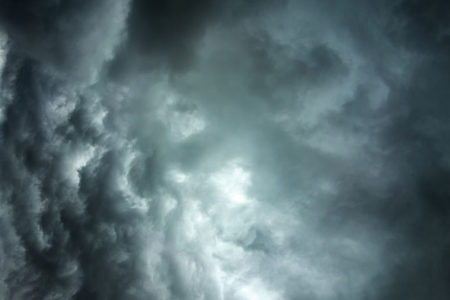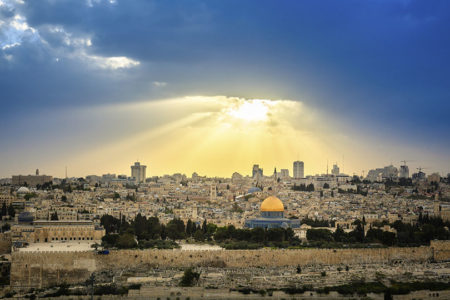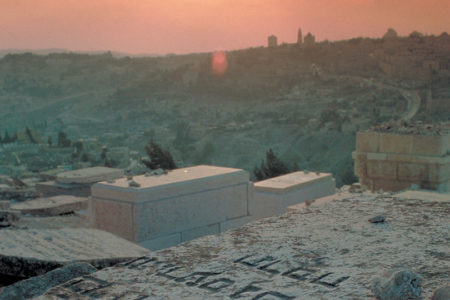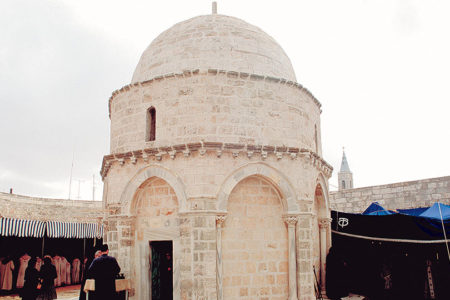The Messianic King and His Kingdom
Micah 5:1–15
For centuries, Jewish people have looked for the Messiah to deliver them from Gentile oppression, secure for them the land of Israel, rebuild the Temple on its historical site, and bring peace to Israel and the world.
Twenty-five centuries ago the Jewish prophets sketched the details of the Messiah’s life and work. He is the only Person in history whose lineage, birth, character, teaching, career, reception, rejection, death, burial, and resurrection were recorded at least five hundred years before His birth. One prophet who foretold the Messiah’s coming was Micah. In chapter 5, Micah provided a number of marvelous prophecies about the Messiah from His birth to His Second Coming when He will establish the Millennial Kingdom.
Messiah Revealed
Micah wrote, “Now gather thyself in troops, 0 daughter of troops; he hath laid siege against us; they shall smite the judge of Israel with a rod upon the cheek” (v. 1). The phrase gather thyself in troops is a call to marshal groups of marauding troops within the city of Jerusalem to defend against a coming siege. The word now seems to describe an attack that is about to begin against Jerusalem, but it is unclear exactly when the attack will occur. Some believe it refers to the Assyrian assault under Sennacherib, mentioned in chapter 4. Others believe the siege is that of Babylon. Still others believe the prophet is speaking about a siege against Jerusalem during the Tribulation before Israel is victorious over her foes at Christ’s Second Coming. The context seems to speak of the Babylonian siege against Jerusalem in 586 B.C., which foreshadows a future siege against Jerusalem during the Great Tribulation.
The invaders will “smite the judge of Israel with a rod upon the cheek” (v. 1). Smiting someone on the cheek signified great dishonor, insult, and humiliation to a ruler in that day. Some teach that the ruler being struck in verse 1 is Christ being hit on the head (Mt. 27:30) and face (Jn. 19:3) at His trial. However, this position is not tenable. There was no siege on Jerusalem when Christ was crucified. The word judge (meaning “ruler”) mentioned in verse 1 is a different Hebrew word from the word ruler in verse 2. The phrase Now gather suggests this event will occur relatively soon, not centuries in the future. The text does not reveal the judge’s identity but probably refers to King Zedekiah, who was tortured by the Babylonians when Nebuchadnezzar’s soldiers invaded Jerusalem (2 Ki. 25:4-7).
Micah turned abruptly from the secular ruler of Jerusalem to predict the coming of a totally different King who will transcend human rulers. The Person Micah revealed in verse 2 is none other than the Messiah, who will be born in Bethlehem Ephrathah (v. 2). Almost 750 years later, scribes made the identity of the Ruler clear when King Herod gathered them together “demanded of them where the Christ [meaning Messiah] should be born” (Mt. 2:4). They answered, “In Bethlehem of Judea; for thus it is written by the prophet” (Mt. 2:5). Then they quoted Micah 5:2:
But thou, Bethlehem Ephrathah, though thou be little among the thousands of Judah, yet out of thee shall he come forth unto me that is to be ruler in Israel, whose goings forth have been from of old, from everlasting.
Throughout the first century, it was commonly held that the Messiah would be a descendant of David, born in Bethlehem of Judea (Jn. 7:42).
A more amazing prophecy than the location of His birth is that His “goings forth have been from of old, from everlasting [eternity]” (v. 2). This One, like God, is eternal. The word everlasting means infinite or timeless in duration and refers to the Messiah’s eternality. This prophecy clearly states that Messiah’s existence predates the creation of the universe. God the Son became the God-man when He was born of the Virgin Mary in Bethlehem of Judea (cf. Isa. 9:6; Jn. 1:1, 14). He will become the Ruler over Israel during the Millennium (Lk. 1:27-33).
Micah went on to reveal that God will “give them up [abandon Israel], until the time that she who travaileth hath brought forth; then the remnant of his brethren shall return unto [ with] the children of Israel” (v. 3). Judah’s spiritual pain at being abandoned by God is similar to a woman’s physical pain in childbirth. She agonizes in pain until the birth of her child; but afterward, the pain of childbirth is replaced with joy. Micah did not reveal when or how these events would take place.
Some believe this verse refers to Judah being subdued by foreign countries between the time Babylon smote the nation until Mary travailed in childbirth at the Messiah’s First Advent. The verse does not refer to Israel’s deliverance at the time of Messiah’s birth because, after that event, Judah was again “led away captive into all nations; and Jerusalem shall be trodden down by the Gentiles, until the times of the Gentiles be fulfilled” (Lk. 21:24).
Others believe Micah 5:3 refers to the time of Messiah’s rejection at His First Coming until Israel’s regathering at Messiah’s Second Coming. This position is more plausible because Israel has been persecuted and dominated by Gentiles since A.D. 70 and is yet to undergo its greatest time of suffering during the Great Tribulation (Jer. 30:5-7). At that time, Israel’s suffering will be like the birth pains of a woman; but after her delivery will come joy. A remnant in Israel will go through the affliction of the Great Tribulation, experience regeneration at the Messiah’s Second Coming, and then be regathered to enjoy Kingdom blessings.
Messiah’s Reign
Messiah will shepherd Israel. In verse 4, Micah described the Lord’s Messianic reign. He shall “stand” as Ruler in the Millennial Kingdom and will “feed” (shepherd) the restored remnant of Israel. Like a shepherd, He will lead, protect, and tenderly care for His people “in the majesty of the name of the LORD.” His rule will manifest “the majesty,” or the heavenly glory and power, of Jehovah on Earth. Israel “shall abide,” or dwell, in the land safely and securely, in perpetuity and prosperity. Messiah’s rule will not be over Israel alone but will “be great unto the ends of the earth” because He is King and Sovereign Lord over the entire world.
Messiah will subdue Israel’s enemies. “And this man [the Messiah previously described] shall be the peace, when the Assyrian shall come into our land” (v. 5). After His Second Coming, the Messiah, who is the Prince of Peace (Isa. 9:6), will be the Source of peace that covers the earth. “The Assyrian” is not the Assyria that invaded Judah in 701 B.C. but a symbol for future invaders who come against Israel in the Great Tribulation. When the invaders attack, “seven shepherds [those guarding the people], and eight principal men [princes or leaders]” (v. 5) will be ample enough (along with the coming Messiah) to repel the attack, for God will give them unusual strength to overcome their enemies.
“And they shall waste the land of Assyria with the sword, and the land of Nimrod in the entrances of it [gates or strongholds of the cities]” (v. 6). Nimrod founded the kingdom of Babel (Gen. 10:10), but the “land of Nimrod” symbolizes the whole Babylonian–Assyrian empire. In the final analysis, it will not be Israel’s leaders who deliver the nation at the end of the Great Tribulation, but the Messiah (Christ) “when he treadeth within our [Israel’s] borders” (v. 6; cf. Zech. 14:3; Rev. 19:15) to destroy its enemies.
A remnant of saved Jewish people will survive the Great Tribulation and will become a blessing to the Gentiles in the Millennial Kingdom. Micah said, “And the remnant of Jacob shall be in the midst of many people like dew from the LORD, like the showers upon the grass” (v. 7). Restored Israel will bring continual, spiritual blessings to the nations as dew and showers refresh the ground after a long, dry spell.
In the Millennium, this saved Jewish remnant will be feared. It will be “like a young lion among the flocks of sheep, who . . . treadeth down, and teareth in pieces, and none can deliver” (v. 8). As a lion strikes fear in the animal kingdom when on the prowl, so Israel will dominate, exert power, and destroy all who oppose her. Whenever Israel will confront an enemy in the Kingdom, it will be the Lord’s hand that will strike down the enemy through them, and “all thine [Israel’s] enemies shall be cut off” (v. 9).
Messiah will guarantee Israel’s security. The Lord will destroy everything Israel relied on in the past for protection. He will destroy its armament and accouterments of war: “I will cut off thy horses . . . and I will destroy thy chariots; . . . I will cut off the cities of thy land, . . . and . . . all thy strongholds” (vv. 10–11). In a peaceful world, Israel will not need horses, chariots, or fortified cities. All these means of defense will be superfluous because the Lord will be in the midst of Israel to defend her and guarantee her security.
Messiah will purge Israel of sorcery and sacred statues. The Lord will destroy the nation’s “witchcrafts [sorcery],” “soothsayers [divination],” and “carved”and “standing images [sacred stones].” The Lord promises, “Thou shalt no more worship the work of thine hands. And I will pluck up thine idols [Asherah poles used in sensual fertility rites]” (vv. 12–14).
For centuries Israel sought spiritual direction through witchcraft and occult practices that included magic and demonic involvement. Often these methods were used to acquire information from demonic sources to curse an individual or nation. Israelites had gone to soothsayers or fortune-tellers who claimed to predict the future. Before Israel entered the Promised Land, God forbade the nation to engage in such practices (Ex. 20:4; Lev. 19:31; Dt. 16:21–22; 18:10–12). With the destruction of idolatry, the Jewish people will no longer worship the work of their hands, but the true and living God who redeemed them.
Messiah will require total submission to His sovereign rule. “And I will execute vengeance in anger and fury upon the nations, such as they have not heard” (v. 15). The Messiah will execute judgment on any individual or nation that defies His sovereign rule. During the Millennium, the Lord will rule with a “rod of iron” (Ps. 2:9; Rev. 12:5; 19:15), immediately put down any insurrection against His authority, and punish those who do not obey Him.
What a tremendous blessing there will be when the Messiah returns. With a redeemed remnant restored to Israel and the Messiah ruling on Earth, the entire world will be blessed with peace and prosperity. Then the long-awaited promises God made to Abraham and David through the covenants will be completely fulfilled for Israel.






